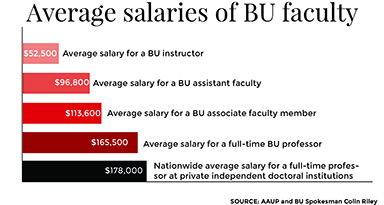
Salaries for full-time university faculty members across the nation rose 1.4 percent in the 2014-15 academic year, according to a Monday report from the American Association of University Professors. This is the second consecutive year in which salaries rose faster than the rate of inflation, the report found.
However, the report stated that faculty members nationwide are currently earning less than they did before the economic recession six years ago.
“The current year-over-year change in salary for all ranks is 1.4 percent, which marks the first single digit improvement since the recession began,” the report stated. “It is hardly encouraging that faculty have not lost ground, since many have been working more hours than ever before. This trend represents a continuation of the long period of stagnation in average full-time faculty salaries.”
Though the report discredits the idea that professors’ high salaries contribute to increasing tuition rates, the report stated that some economists believe the salary increases are indicative of “Baumol’s cost disease,” which is often cited to explain why costs in higher education are rising faster than in the rest of the economy.
“According to Baumol’s theory, the rate of increase in faculty salaries would be higher than the inflation rate and proportional to the increase in tuition because services simply cost more over time,” the report stated.
The report stated that full-time professors at private independent doctoral institutions made average salaries of nearly $178,000 and average total compensation packages of nearly $224,000 in the 2014-15 year. Full-time lecturers and instructors at community colleges, however, earned average salaries of about $48,000 and total compensation packages of just under $67,000.
Professors at Boston University make $165,500 annually on average, according to statistics sent by BU spokesman Colin Riley. Additionally this year, associate faculty members’ salaries averaged $113,600, assistant faculty averaged $96,800 and instructors’ salaries averaged $52,500, according to the information from Riley.
Karen Robbins, an adjunct professor in the College of Arts and Sciences, said the report was interesting, especially from her perspective as a part-time faculty member. Robbins said she does not believe professors, especially not adjuncts, are paid too much.
“At BU, we get paid more as adjuncts than other schools, but it is still not a living wage,” she said. “Right now, the job market is terrible, and [adjunct professors] don’t get any benefits and schools pay them less. It is interesting that adjuncts are trying to unionize, yet at all the schools I’ve been an adjunct at, BU is the best to us, but it’s still not going to pay my rent.”
Several students have various opinions on whether BU professors make sufficient salaries.
Erin Deadmon, a senior in CAS, said she agrees with the AAUP’s report, especially that increasing salaries for BU faculty do not contribute to rising tuition.
“If you are a good professor you are worth the money,” she said. “There are many professors here that put in the effort, have students who love them and deserve what they make because they make the university what it is. They should get substantial pay to match their education.”
Nelson Lin, a sophomore in the Questrom School of Business, said the report was interesting and that he generally agreed with it.
“For the most part I think professors earn their money, even though there are some that I don’t think should have a contract,” Lin said. “I don’t have a problem with the high salaries of professors. I’ve had professors that I’ve liked and [that] I think earn their money.”
Michael Nickerson, a senior in CAS, said he has not previously thought about faculty salaries, but thinks professors are generally overpaid.
“BU, as a private four-year research university, has pretty high average salaries for professors,” he said. “In my opinion, some professors may deserve it, but it’s a lot of money and it is rising, nationwide. [The rise in faculty salaries] has to add, slightly, to increased tuition. In a school where tuition is so high, I question the salary of our professors.”























































































































